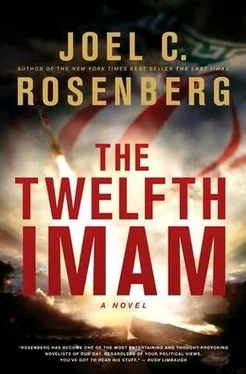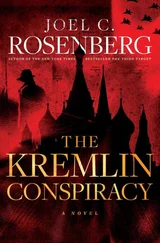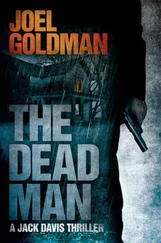Both men offered their condolences for David’s loss.
“It was a long time ago,” he replied, using a napkin from the coffee table as a tissue to wipe his eyes.
“It obviously still affects you a great deal,” Rashidi said with a tenderness David would not have expected. “I lost my parents when I was very young as well. It was a boating accident. I was only seven, but I know what you’re going through.”
David nodded with identification.
Esfahani then asked if he had any siblings. David looked down and said no. He was the “miracle” child in the family, he explained, the only one born after several miscarriages and multiple fertility treatments. When Rashidi asked why he went to college in Germany, David explained that he had never felt comfortable in Canada, that it was too influenced by the immorality and godlessness of the Americans. “What I really wanted to do was come to Iran.”
“Why didn’t you?” Rashidi asked.
“I didn’t know anyone,” David said. “All my grandparents passed away before I was born. And I was offered a scholarship to a school in Germany.”
“Your family, they were all from Tabriz?” Esfahani inquired.
“Yes,” David confirmed, “but I had never been here before. I had no money. It just seemed like first I ought to get some schooling, develop some skills, and make a little money. Then I hoped I could find a way to come back here and reconnect with the land of my fathers and see if there was something I could do to… you know, to help.”
Rashidi looked at Esfahani and then back at David. “I hope I’m not the first to say it, but welcome home, young man.”
“Actually, Mr. Rashidi, you are, and thank you,” David said. “I can’t explain what a joy it is to finally be here and what heartache it has been for me for the past few days to think that rather than being a blessing to you and your great company and this great country, somehow I might have brought dishonor.”
“No, no,” Rashidi said. “No more of that. It was a simple mistake, and it is all behind us now. We must move forward.”
“Thank you, sir,” David said. “I would like that very much.”
Before long, David’s mouth was beginning to water as the aromas of all kinds of dishes began emanating from the kitchen. Fortunately, within a few minutes, it was announced that dinner would be served. Rashidi guided David around the corner to a beautifully appointed dining room with a large table set for three with fine china and pressed linens. To one side of the room there was another table perhaps three or four meters long, covered with a variety of dishes, far more than they could possibly eat in one night. There was an entire roasted lamb on a silver tray in the center of the table, surrounded by pots of all kinds of stews-pomegranate, eggplant, herb, okra, and celery-and a fava bean rice dish with sheep shank.
But best of all, and much to David’s surprise, there was a large bowl of Shirin Polo , one of his favorites and his mother’s specialty. It was a beautiful, colorful dish of steaming basmati rice adorned with sweetened and slivered carrots, almonds, pistachios, orange rind, and saffron. David couldn’t wait to dive in.
Each man helped himself to a plate and sat down.
But just as David began to take a bite, the questions started coming faster and faster. The interrogation phase was over. Rashidi and Esfahani were growing comfortable with him, but they were by no means finished. Now they shifted to the delivery phase.
“How quickly can MDS have teams of technicians on the ground in Tehran?” Esfahani asked.
David reiterated what he had promised Esfahani outside the Imam Khomeini Mosque. The teams could be there within a day or two if he called soon and set them into motion. They were all on standby.
“How long will it take them to do their work?” Rashidi asked.
“For the first phase, with testing, I’d say about a month,” David said. “But as you know from our proposals, the second, third, and fourth phases will take the better part of a year, altogether.”
Was he aware that each technician would be assigned two translators, each working six-hour shifts, as well as a security team?
David said he was. But he added that several of them already spoke Farsi. What’s more, MDS was in the process of hiring and training another dozen Farsi-speaking technicians, though they probably wouldn’t be ready until late spring. Rashidi liked this very much.
Esfahani wanted to know how quickly the monitoring center could be up and running.
David knew the executive was referring to the high-tech operations center MDS had committed to outfitting that would allow Iran’s security services to intercept, monitor, trace, and record any call on their new wireless system. He replied that his teams needed to get the software installed on Iran Telecom’s mainframes first, and then they would focus on setting up the monitoring center.
“No,” Esfahani said, “that won’t do. We want the software to be installed and the center to be outfitted simultaneously.”
“That’s not part of the contract,” David said.
“We’ve changed our minds,” Rashidi said. “We like you. We trust you. We want you to do this for us. Will that be a problem?”
“It will cost more, and we’ll need three or four days to get that team assembled, but we can certainly do it, if you want.”
“Cost is no object,” Rashidi assured him. “Time is the issue. Can everything be done in a month?”
“That’s really Ms. Fischer’s call.”
Esfahani’s mood suddenly darkened at the mention of Fischer. “That’s not what we asked,” he said curtly. “Can the software and monitoring center all be installed and ready in one month’s time?”
“It can,” David said. “Again, I need Ms. Fischer’s approval, but I don’t see this being a problem.”
“I thought you were the new project manager,” Esfahani said.
“Here, yes, but I still report to Ms. Fischer in Dubai,” David explained. “Is that a problem? You won’t have any interaction with her whatsoever, I assure you.”
“I’m sure that is true,” Rashidi said. “But I think what my colleague means is that, given all that has happened, is there any reason for us to be concerned that this Ms. Fischer would refuse to move the project faster because perhaps she was offended by her time here?”
That wasn’t, of course, what Esfahani meant, David knew. The man was simply using religion as his cover to discriminate against a highly qualified colleague and new friend. But he was not about to point that out and blow this deal-not when it seemed to be going so well.
“Believe me, Mr. Rashidi and Mr. Esfahani, everyone in our company knows how important this project is,” David assured them. “Ms. Fischer knows this most of all. I can assure you that she is a consummate professional. She won’t let her personal feelings affect her performance. The only real issue is getting you a cost estimate, which I can have for you by the close of business tomorrow. Once you approve the estimate, all that remains will be to have Ms. Fischer pull together the equipment for the monitoring center and assemble a second crew that can arrive by the end of this week or early next.”
“Will you push for this to be done?” Esfahani asked.
“Absolutely.”
“We’re counting on you, Mr. Tabrizi,” Esfahani stressed.
“Thank you, sir,” he replied. “I appreciate your trust.”
Now Rashidi took the lead again. “You know that I just got back from Beijing, right?” the CEO said.
“Yes, sir,” David said. “I read that in the newspaper.”
“The Chinese are begging us to give them this contract.”
Читать дальше












